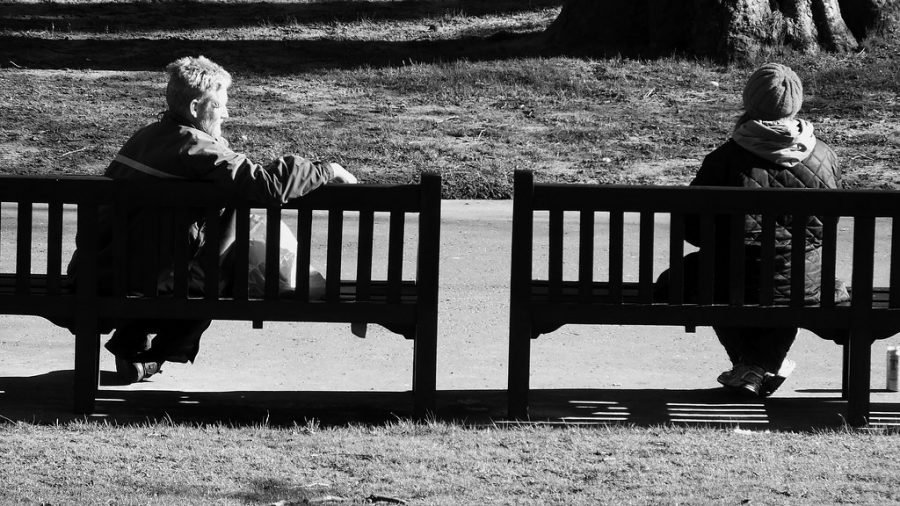COVID-19 pandemic takes toll on college dating scene
“We Are Observing Social Distance” by byronv2 is licensed with CC BY-NC 2.0. To view a copy of this license, visit https://creativecommons.org/licenses/by-nc/2.0/ With social distancing measures in place due to the pandemic, the dating scene has taken a toll.
February 16, 2021
When Alena Porter, a fifth-year electrical and computer engineering combined major, downloaded Hinge in September, it was because after months of quarantine due to the COVID-19 pandemic, she was beginning to feel lonely.
“I miss going to bars or parties and just talking to people, getting to know people,” she said. “I don’t get to meet anyone new these days because all I do is work from home.”
Porter was supposed to be in California for co-op, but due to COVID-19, she is working remotely from Boston. All of her coworkers are older than her and three time zones away, so Hinge was a better romantic outlet for her. She liked the system on Hinge more than other dating apps, but as she had expected it did not work for her.
“It was great at first because it was like, ‘Oh cool, I can meet new people, I can talk to people,’” Porter said. “But then I got bored.”
She is not the only one experiencing this. Quarantine drew people apart physically, and many college students resorted to apps like Hinge, Tinder and Bumble for their dating fix.
However, some students are not using these apps because they want to – it is their only option. Beyond just wanting a romantic connection, college students are beginning to feel the negative effects of lacking in-person interaction.
“I think people are getting fatigued,” said Steve Granelli, an assistant teaching professor in the department of communication studies. “Because they’re getting fatigued, one of two things is going to happen: They’re just going to revert back to what they normally would do – take more risks, see people in person, maybe get COVID; or they’re going to have to make more effort to be vigilant and maintain those relationships through this medium.”
Students who prefer meeting people organically are struggling to find satisfaction in the COVID-19 pandemic era, when it is a choice between dating 100% online and the health risk of meeting people in person.
“I would definitely much prefer meeting in person, but it’s hard with the pandemic,” said Chris Berros, a graduate student in the College of Professional Studies’ Homeland Security program. “The masks and the distance and just feeling weird being outside – that’s putting me off from even attempting it.”
Many college students feel like this; they cannot meet people in clubs or at events, so they may resort to dating apps, but it is significantly more difficult for them to feel a connection.
“Dating is becoming very hard during the pandemic because you can’t make that first impression in person,” Berros said. “You really have to establish all that – the first impression, the interest and the chemistry – online.”
So why are students who prefer meeting people in person and swear against dating apps downloading Hinge, Tinder and Bumble?
“We all have needs that we’re trying to fulfill through all communication interactions, especially relationship-based communication. We have needs for inclusion, we want to feel like we belong, not even in a group but just with somebody else,” Granelli said. “Everybody wants to feel affection in some way, and the only way we’re going to get that is through other people.”
Though some college students are comfortable meeting people online, those who are not struggle to meet those needs when Hinge texts and Zoom dates do not d0 the trick.
“You need to establish some chemistry and some of that is physical chemistry. And you definitely can’t do that on Zoom,” Berros said. “So my first time meeting someone, I’d like it to be in an environment where we can really express ourselves and see where that goes.”
Caroline Evans, a fourth-year pharmacy major, shares Berros’ sentiment. She downloaded Tinder as a first-year but has deleted and redownloaded it multiple times.
“I’ve met a couple people and gone on dates with them. But I never have a second date just because texting and messaging is not at all my preferred way to interact,” Evans said. “I feel like you really can’t get to know someone that well that way.”
Brett Ingram, an assistant professor of the practice in the communication department at Boston College, said that college is the perfect time for people to have bad relationships that teach them how to be humble, accept rejection and criticism and have adult relationships.
“[College] should be a time when you are physically interacting with each other so that you can understand that communication can’t just happen via text, through words typed on a screen,” he said. “It doesn’t capture the nuances of facial expressions, and movement, and physical closeness and proximity and boundaries. It’s a disastrous thing that’s happening.”
Even if these college students are meeting the perfect person on Tinder, COVID-19 remains a concern that usually hinders them from meeting in person.
“Let’s say you meet the best person ever on a Zoom date,” Berros said. “That’s great, and you guys can keep texting and Zooming, but at what point is it safe enough to meet? To actually take it to that next level? If you’re going to be romantic and sexual, it’s got to go there at some point.”
Because of the hindrance of masks, Berros said, it’s difficult to make an intimate connection.
“You can’t, like, romantically take someone’s mask off,” he said, laughing.
Luke San Antonio Bialecki, a fourth-year computer science major, said that the possibility of giving or receiving COVID-19 on an in-person date is a risk.
“[It] does make me second guess if I’m making plans and go, ‘Okay, maybe instead of seeing this person, and then this person one day after another, I’m going to spread them out so that I have a chance to get a test in between.’ It changes my thinking there,” he said.
San Antonio Bialecki, who has Crohn’s disease, moved back home to Long Island from Boston because his medication makes him partially immunocompromised, and he would rather “control the controllables.” But that cuts him off from the college dating scene even more.
Granelli agrees with controlling the controllables but understands that not much in the pandemic is controllable other than taking the necessary precautions to stay safe.
“Every extra decision that you make is another risk,” Granelli said. “I mean, the easiest way to not get COVID is to never leave the house and never talk to anybody. There you go, done.”
The risk of COVID-19 puts an extra stressor on the already stressful situation of dating.
“If the right person comes along and we have a great Zoom date, that’s great, but then the whole world of questions opens up,” Berros said. “When can we meet each other? Where are we going to each other? We’re going to have to sit in a field somewhere. I can’t take you to dinner.”
Berros believes that meaningful long-term relationships cannot start online, especially during COVID-19, when it is likely to stay online and fizzle out. “There’s only so far you can take it,” he said.
Bryan Vogt, a third-year mathematics major with a minor in economics, said that though he was never a “party person” and the lack of in-person interaction has not had much of an effect on him, worrying about COVID-19 has put a damper on his dating opportunities.
“I think really just the anxiety of public health and new restrictions on meeting people is the main thing that has been an issue for me,” he said.
Evans said that she felt lucky to be a student who has constant access to testing and quick results to offset some of the worry of dating in person. But she recognizes that it does not take away all possibility of giving or receiving COVID-19 on a date.
“I actually am going on a date on Sunday,” she said. “And obviously there’s some risk there. But I have the ability to get a test before, get a test after and be assured that I don’t have COVID, and I didn’t just give this person COVID. Probably.”
Though the world has not stopped turning during the pandemic, the effects of COVID-19 on college students who are looking for romantic connection are drastic – and likely not going anywhere.
“I just miss the days of going and meeting someone at a bar or at a party, getting to know someone organically,” Porter said. “Everything I do these days, COVID is on the mind.”







